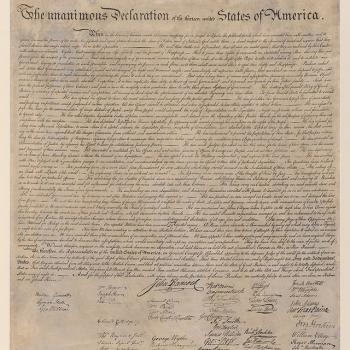
It’s been a month since the meltdown with my grandmother and aunts.
I’ve been thinking about that situation every single day since then.
I’ve felt guilty and I’ve stewed about what I could have possibly done.
I’ve burned at the thought of what my family was saying about me, at their reunion the second week of August. I wondered for the thousandth time if I could explain myself more clearly and they’d finally understand what happened.
And earlier today, I saw a post on social media which has really helped me resolve one of the things I’ve been worried about. Maybe it will help anyone else who’s been through the same thing.
I don’t know when I started following Wil Wheaton on Twitter, but I’ve been fascinated by the things he’s said about abusive parents and family estrangement. Recently someone asked him what to do about the fact that abusive parents often spread rumors about you to the rest of the family, so you find yourself with no family at all.
Wil responded with a beautiful statement that included the following line:
“That’s the important part: there’s nothing you or I can do to change the story someone else tells themselves about us. They have to realize that you aren’t the story someone else has told them about you, and we can’t make them do that.
So what I’ve done is accept that I can’t change how someone else views me, when that person is invested for one reason or another in believing a lie about me. I accept that it hurts. I accept that it’s a loss. I grieve the loss.
And I do the only thing I can do, which is continue to live my best life, be honest and accountable to myself and the people I love, and not let the story someone tells themself about me dictate who I am or how I live my life. I don’t have to respond to or even acknowledge the version of me that someone created in their head. I do not owe anyone that, and neither do you.”
His whole answer is worth your time; you can read it here.
I’ve been chewing on that all day: that there’s nothing I can do to change the story someone else tells themself about me.
I am now estranged from my extended family. I don’t know how to summarize all the events of the past dozen years in a blog post, but it was something like this: My mother was emotionally and spiritually abusive to me for much of my childhood. When I tried to set boundaries and limits with her after I moved away from home she responded by taking no responsibility and asserting her perceived right to hurt me even more. I tried explaining myself, listing the things she’d done that were hurting me, in longer and longer emails trying to get through, but she refused to understand. I eventually had to go no-contact for a few years. After Adrienne was born I tried to have a relationship with my family, but my mother was insulted by my husband and walked out. After that I had a tense, limited relationship with my extended family but not with my parents and siblings. I recently had to cut off even that to keep Adrienne from being spiritually abused.
I’m given to understand that my situation is pretty typical, of people who become estranged from their parents. First the adult child tries to set boundaries, but the parent is insulted at the idea of boundaries; the parent calls the child spoiled and narcissistic and keeps overstepping boundaries on purpose to assert themself. Then the adult child tries limited contact but the parent keeps overstepping, insisting that the adult child doesn’t have rights. Finally, after it’s all gone too far, the child goes no-contact. And then the child either gets mobbed or shunned by the extended family, or first one and then the other, because the insulted parent recruits them to punish the child into compliance, and things progress from there.
Part of the reason I was holding out for so long, trying to have a relationship with the family, is that I was afraid of what they’d say.
I got a strange message from an aunt (I have a lot of aunts), re-writing the history of my childhood and telling me about things that certainly did not happen. She claimed I had medical conditions that I never had. I corrected her, meticulously, in a message I drafted several times and showed to a social worker friend who critiqued it and helped me to express myself even more carefully. But the aunt refused to grant that maybe I had seen the paperwork the pediatric doctor faxed to the adult doctor after I moved away from home, and knew of my diagnoses better than she did. She chose to believe that what she’d assumed was real instead of what I said. She held onto her beliefs even after admitting she’d lived a thousand miles away when I got sick and only heard about it secondhand.
Meanwhile my grandmother was sending us gifts through the mail, to help with the rent, and I didn’t like to take them but I didn’t know what else to do. We are pretty low income, so I cashed the checks. I knew that my family was gossiping amongst themselves about me for taking them. My mother’s oldest sister, in particular, the family tyrant who lives with my grandmother, would even send me messages on Facebook to taunt me for being entitled and lacking humility. She also had assumptions about my childhood medical conditions which weren’t true and syndromes she wanted me to research to diagnose myself– curiously, since the first aunt is actually a nurse and Aunt Tyrant isn’t a medical professional at all. I was afraid to block her because I knew she’d go and gossip about me for doing that. Sometimes I would bother to try to correct her assumptions, but pretty soon I gave up and just responded with a terse “thanks for telling me!”
I sent my grandmother pictures and messages through Facebook so she could see how Adrienne was growing, even though she didn’t visit me in person. I tried to communicate. My grandmother would never come out and say what she was thinking, only drop hints that she didn’t approve of me. So I’d try to communicate harder, and it didn’t work.
I would tell her about my diagnoses, about how the chronic fatigue had ruined my life, back before my PCOS diagnosis when I was told I had chronic fatigue syndrome. She would say “we’re all chronically fatigued by this thing called life,” and I’d try to explain that chronic fatigue was a real illness, and she wouldn’t understand.
She would send me a card asking me to “dump the chump and let me UBER you to the family reunion” and I would write, trying to explain that I couldn’t travel right now, and she wouldn’t understand.
She would fret that Adrienne wasn’t being raised “in the church” without saying why she thought so, and talk about what a great day it would be when she “came into the church.” I would explain the things we were doing to catechize Adrienne and how she was helping me pack backpacks for the homeless, and my grandmother wouldn’t understand that that meant her great granddaughter was Catholic.
And I kept trying to explain myself and my choices to her, but she continued to refuse to understand.
And then the horrible note where she managed to insult my sexuality while accusing me of pride, demanding I drop everything and drive out to stay with her for a surprise First Holy Communion. And I said we were working on a First Holy Communion, and that Adrienne loved Jesus very much.
And then Aunt Tyrant wrote that note calling me the insulting nickname and telling me I was cut off, to punish me for not giving into Granny’s plan to push Adrienne into a First Holy Communion at her house with a priest she knew and I didn’t, with Aunt Tyrant there to humiliate me, with Adrienne embarrassed and confused by all the pageantry they no doubt wanted. And I was angrier and more humiliated than I’d ever been, because now it wasn’t just about me. They were going after my daughter. I was sure for the first time that I was never going to have a real relationship with my granny. And yet, I still felt afraid to just stop talking to her, because I was afraid she and my aunts would gossip about me and claim I’d only been friendly with her to get those awkward checks.
I didn’t know what to do.
But then I decided that, on second thought, I did.
I was going to cut them all off and go no-contact. I blocked my aunts. I even blocked my grandmother.
When a cousin wrote to me to defend her mom, I blocked the cousin.
I worried and stewed about what they’d say, but I also knew I couldn’t change a thing.
When people are determined to believe you’re a bad person, there is nothing you can do to change their mind. They will go on believing it forever because that is what they want to believe. There’s no talking them out of it.
I might as well live the life I want.
What I want to do is love my husband and daughter, and any late in life rainbow child that comes along. I want to care for the guinea pig and help the Friendship Room and the Lost Girls and visit my friends at the hiding place whenever I can. I want to keep deconstructing the toxicity I absorbed in the Charismatic Renewal and discover all I can about the God I’ve experienced is loving and worth my time, instead of the evil despot of my childhood. I don’t want to keep explaining myself.
And that’s my advice for all of you. Live the life you were called to live, because it’s the only life you’re going to get. You can’t have one where you win over the people who are determined not to be won. You’re stuck with this one. Do what you can with it.
I guess that’s a sad thought, but it’s also a relief.
And we’ll see where we go from there.
image via Pixabay
Mary Pezzulo is the author of Meditations on the Way of the Cross, The Sorrows and Joys of Mary, and Stumbling into Grace: How We Meet God in Tiny Works of Mercy.

















